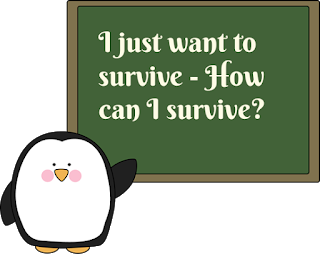How to Survive A Pitch Appointment

It's time for a full confession.
I. Do. Not. Like. Pitching. There, I said it.
As a veteran of getting on for twenty writing conferences and many pitch appointments, I can say with some authority that I do not enjoy the process. I am awkward and nervous and tongue-tied to a ridiculous degree.
So why am I posting here on the intricacies of pitch appointments and how to excel at them?
Well, if you re-read the title of the post, you'll note that I'm not telling you how to hit a home run in a pitch appointment, I'm telling you how to SURVIVE one. :)

Follow me into the labyrinth, if you please.
First, what is a pitch appointment?
At writing conferences, you often have the opportunity to secure one-on-one appointments with mentors, agents, editors, and other industry professionals. This is your chance to talk about your work and yourself with a view to selling both at some later date.
For some of us, the idea of sitting down with an agent or editor and talking up our story is torturous. But it's a necessary part, and even a good part, of becoming a professional author. (There are a select few who THRIVE on these appointments, but they're the outliers, so we're going to ignore them. The weirdos.)
So, if pitch appointments are something we should do, and yet we don't like doing them, and they do, in fact, scare us, how can we strategize to at least survive them, even if we don't exactly THRIVE?
Here are my tips:

1) Do your research. There's nothing that will add to the awkwardness of a face-to-face pitch meeting than if you bring in something that the agent or editor isn't looking for, doesn't represent, and perhaps doesn't even like. Most conferences will have a website that lists the faculty, and in their bios, if they are taking appointments, they will list the things they are looking for, and the things they are not wanting to see. Don't assume that you've written such a heartbreaking work of staggering genius that the editor will abandon the entire publishing history of their house and champion your cause and yours alone at the next publication board meeting. Start out on a good note by scheduling pitch appointments with people who rep what you write.
2) Manage your expectations. This one is key. You are NOT going to walk out of a 15 minute appointment with a contract. These meetings are for getting your foot in the door, not for signing the mortgage and calling the movers . The hope from this meeting is that you will receive a request for a proposal, that you've interested the agent or editor enough in yourself and your project for them to want to see a bit more. HOWEVER, if you do not receive a proposal request, the meeting was NOT a failure. You will have learned a bunch, and your name and face will now be familiar to the person you pitched to, so that next time you see them or pitch to them, you've got a bit of a connection.
3) Prepare a One Sheet: I blogged about this last month, so no need to go over it again here. You can read about how to prepare a One Sheet HERE: https://seekerville.blogspot.com/2018/06/what-goes-on-one-sheet.html

4) Do your homework. (This isn't the same as doing you research.) This one requires that you practice your elevator pitch (We'll talk about how to write an elevator pitch a bit next month.) Doing your homework requires that you be able to distill your story down to 30-50 words. Who it is about, what they want, and the major conflict that is keeping them from getting what they want. This needs to be succinct, pithy, and interesting.
‘A police chief, with a phobia for open water, battles a gigantic shark with an appetite for swimmers and boat captains, in spite of a greedy town council who demands that the beach stay open .’
And there, ladies and gentlemen, you have the perfect elevator pitch. (JAWS: A very good book, but an even better movie!)
You need to know your story inside and out to be able to talk intelligently about it in a concise way. We can all ramble for days about our plot and characters, but I guarantee that if you do this in your pitch appointment, the agent or editor's eyes will glaze over and they will start wondering when it will be time for lunch.
Once you have your 30-50 word pitch written, you need to practice saying it aloud. Start alone, looking in the mirror, then try it out on your family or a writing buddy. Be able to speak slowly, succinctly, and coherently about your story and to be able to answer questions posed by the listener. You might think this is a dorky thing to do, but trust me, you'll thank me later.
5) Do a Quick Reconnaissance: When you get your pitch appointment info, do a quick recce and locate where the appointments are going to take place so you can find it again when you need to. The last thing you want as your meeting time approaches is to be wandering the halls of a giant hotel or conference center hollering "Marco!" Find out where they appointment desk is, where the "Kiss and Cry" area is. (That waiting room where folks about to go into an appointment sit and wipe nervous sweat, and where those just exiting appointments can gracefully subside into a chair and pray in thanksgiving that they survived....Just kidding, but there usually is a 'holding pen' sort of area near the appointment desk where writers are herded to patiently wait for their appointment.
6) Pray About It: Spend a little time in prayer beforehand, reminding God (and thus yourself) that your entire writing future does not hinge on the 10-15 minutes you will be with EditorX or AgentY. Also spend a little time praying for that agent or editor, and consider how you might be a blessing to them during that time. Thank the Lord for the opportunity, and then use it to the best of your ability.
So, what can you expect from your pitch appointment?
Get to the appointment desk with 10-15 minutes to spare, (make sure you've visited the facilities before you arrive, nerves and coffee, you know...) have your materials in order, and say a quick prayer. When your appointment time is called, you can expect to be ushered into a room with up to 20 different tables where pitches will be taking place simultaneous to yours. Don't let this daunt you, you won't be listening to other people pitch, and they won't be listening to you. Everything is done in quiet orderly fashion, not a free-for-all. Sit down across from the agent or editor and smile, offer your hand, and introduce yourself. Hand them your one-sheet. Remember that this is not their first rodeo, and give them a moment to scan your paper and perhaps ask you to tell them about your story. This is where you launch into your elevator pitch. Don't talk too fast, and try to have a pleasant expression on your face. Its' okay to be a bit nervous. They're used to that. As pros, they will often have a few pithy questions for you. I always find it easier to answer questions about my work than just talk about it off the cuff, so I welcome the questions. They may ask for a little of your writing background, what you've published before (It's okay if you're unpublished! Just say so!) and if the manuscript is complete or not.
When time is called, (it will go faster than you think!) stand, offer your hand again, and thank the agent or editor for his or her time. Don't start sobbing if they don't ask to see more of your work or if they return the one-sheet you labored over so long. Be gracious, and be kind.
Oh, and one more thing!

7) Follow Through Afterwards: If you've received a request for a proposal or full manuscript, then by all means, send it in! You don't have to hit send on the airplane ride back home, but do follow through and deliver what has been requested. A month or six weeks is a good time frame if you're polishing a proposal or manuscript. If you didn't receive a request for a proposal, it's still nice manners to send a thank-you note to that person for meeting with you. This will be remembered.
Q4U: Have you done any pitch appointments? What's the BEST pitch story you've heard? What's the WORST pitch appointment story you've heard. No names (unless it's yours and you don't mind sharing.) Also, do you LIKE pitch appointments? Or are you normal? LOL!
 Best-selling, award-winning author Erica Vetsch loves Jesus, history, romance, and sports. She’s a transplanted Kansan now living in Minnesota, and she married her total opposite and soul mate! When she’s not writing fiction, she’s planning her next trip to a history museum and cheering on her Kansas Jayhawks and New Zealand All Blacks. You can connect with her at her website, www.ericavetsch.com where you can learn about her books and sign up for her newsletter, and you can find her online at https://www.facebook.com/EricaVetschAuthor/ where she spends way too much time!
Best-selling, award-winning author Erica Vetsch loves Jesus, history, romance, and sports. She’s a transplanted Kansan now living in Minnesota, and she married her total opposite and soul mate! When she’s not writing fiction, she’s planning her next trip to a history museum and cheering on her Kansas Jayhawks and New Zealand All Blacks. You can connect with her at her website, www.ericavetsch.com where you can learn about her books and sign up for her newsletter, and you can find her online at https://www.facebook.com/EricaVetschAuthor/ where she spends way too much time!
Published on August 26, 2018 21:00
No comments have been added yet.



